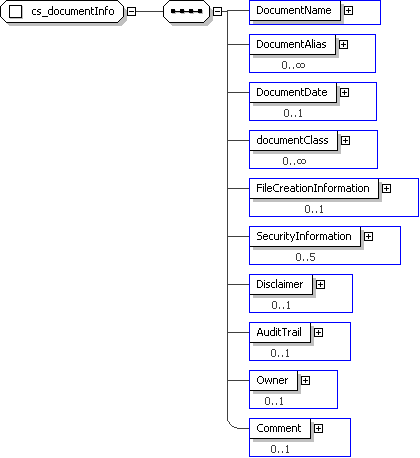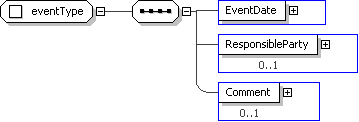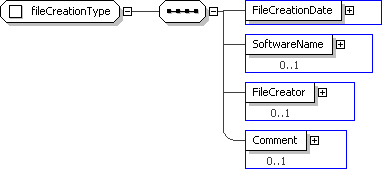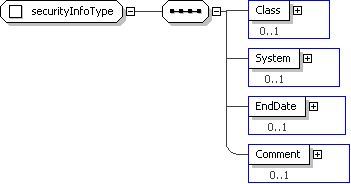
| Target Namespace | http://www.witsml.org/schemas/131/addendum/combo |
|---|---|
| Version | 1.3.1 |
| Element and Attribute Namespaces |
|
| Schema Composition |
|
| Prefix | Namespace |
|---|---|
| witsml | http://www.witsml.org/schemas/131/addendum/combo |
| xml | http://www.w3.org/XML/1998/namespace |
| xsd | http://www.w3.org/2001/XMLSchema |
| Super-types: | None |
|---|---|
| Sub-types: | None |
| Name | auditType |
|---|---|
| Used by (from the same schema document) | Complex Type cs_documentInfo |
| Abstract | no |
| Documentation | The audit records what happened to the data, to produce the data that is in this file. It consists of one or more events. |

| Super-types: | None |
|---|---|
| Sub-types: | None |
| Name | cs_documentInfo |
|---|---|
| Abstract | no |
| Documentation | A schema to capture a set of data that is relevant for many exchange documents. It includes information about the file that was created, and high-level information about the data that is being exchanged within the file. |
'An identifier for the document. This is intended to be unique within the context of the NamingSystem.'
'Zero or more alternate names for the document. These names do not need to be unique within the naming system.'
'The date of the creation of the document. This is not the same as the date that the file was created. For this date, the document is considered to be the set of information associated with this document information. For example, the document may be a seismic binset. This represents the date that the binset was created. The FileCreation information would capture the date that the XML file was created to send or exchange the binset.'
'A document class. Examples of classes would be a metadata classification or a set of keywords.'
'The information about the creation of the exchange file. This is not about the creation of the data within the file, but the creation of the file itself.'
'Information about the security to be applied to this file. More than one classification can be given.'
'A free-form string that allows a disclaimer to accompany the information.'
'A collection of events that can document the history of the data.'
'An optional comment about the document.'

| Super-types: | None |
|---|---|
| Sub-types: | None |
| Name | eventType |
|---|---|
| Used by (from the same schema document) | Complex Type auditType |
| Abstract | no |
| Documentation | An event type captures the basic information about an event that has affected the data. |
'The date on which the event took place.'
'The party responsible for the event.'
'A free form comment that can further define the event that occurred.'

| Super-types: | None |
|---|---|
| Sub-types: | None |
| Name | fileCreationType |
|---|---|
| Used by (from the same schema document) | Complex Type cs_documentInfo |
| Abstract | no |
| Documentation | A block of information about the creation of the XML file. This is different than the creation of the data that is included within the file. |
'The date and time that the file was created.'
'If appropriate, the software that created the file. This is a free form string, and may include whatever information is deemed relevant.'
'The person or business associate that created the file.'
'Any comment that would be useful to further explain the creation of this instance document.'

| Super-types: | None |
|---|---|
| Sub-types: | None |
| Name | securityInfoType |
|---|---|
| Used by (from the same schema document) | Complex Type cs_documentInfo |
| Abstract | no |
| Documentation | Information about the security classification of the document. This is intended as a documentation of the security so that the file will not inadvertently be sent to someone who is not allowed access to the data. This block also carries a date that the security classification expires. For example, a well log is confidential for a period of time, and then becomes open. All security classes are characterized by their classification systems. |
'The security class in which this document is classified. Examples would be confidential, partner confidential, tight. The meaning of the class is determined by the System in which it is defined.'
'The security classification system. This gives context to the meaning of the Class value.'
'The date on which this security class is no longer applicable.'
'A general comment to further define the security class.'

| Super-types: | Address < AusAddress (by extension) |
|---|---|
| Sub-types: |
|
| Name | AusAddress |
|---|---|
| Abstract | no |
The XML Instance Representation table above shows the schema component's content as an XML instance.
Abstract (Applies to complex type definitions and element declarations). An abstract element or complex type cannot used to validate an element instance. If there is a reference to an abstract element, only element declarations that can substitute the abstract element can be used to validate the instance. For references to abstract type definitions, only derived types can be used.
All Model Group Child elements can be provided in any order in instances. See: http://www.w3.org/TR/xmlschema-1/#element-all.
Choice Model Group Only one from the list of child elements and model groups can be provided in instances. See: http://www.w3.org/TR/xmlschema-1/#element-choice.
Collapse Whitespace Policy Replace tab, line feed, and carriage return characters with space character (Unicode character 32). Then, collapse contiguous sequences of space characters into single space character, and remove leading and trailing space characters.
Disallowed Substitutions
(Applies to element declarations). If substitution is specified, then substitution group members cannot be used in place of the given element declaration to validate element instances. If derivation methods, e.g. extension, restriction, are specified, then the given element declaration will not validate element instances that have types derived from the element declaration's type using the specified derivation methods. Normally, element instances can override their declaration's type by specifying an xsi:type attribute.
Key Constraint Like Uniqueness Constraint, but additionally requires that the specified value(s) must be provided. See: http://www.w3.org/TR/xmlschema-1/#cIdentity-constraint_Definitions.
Key Reference Constraint Ensures that the specified value(s) must match value(s) from a Key Constraint or Uniqueness Constraint. See: http://www.w3.org/TR/xmlschema-1/#cIdentity-constraint_Definitions.
Model Group Groups together element content, specifying the order in which the element content can occur and the number of times the group of element content may be repeated. See: http://www.w3.org/TR/xmlschema-1/#Model_Groups.
Nillable
(Applies to element declarations). If an element declaration is nillable, instances can use the xsi:nil attribute. The xsi:nil attribute is the boolean attribute, nil, from the http://www.w3.org/2001/XMLSchema-instance namespace. If an element instance has an xsi:nil attribute set to true, it can be left empty, even though its element declaration may have required content.
Notation A notation is used to identify the format of a piece of data. Values of elements and attributes that are of type, NOTATION, must come from the names of declared notations. See: http://www.w3.org/TR/xmlschema-1/#cNotation_Declarations.
Preserve Whitespace Policy Preserve whitespaces exactly as they appear in instances.
Prohibited Derivations (Applies to type definitions). Derivation methods that cannot be used to create sub-types from a given type definition.
Prohibited Substitutions (Applies to complex type definitions). Prevents sub-types that have been derived using the specified derivation methods from validating element instances in place of the given type definition.
Replace Whitespace Policy Replace tab, line feed, and carriage return characters with space character (Unicode character 32).
Sequence Model Group Child elements and model groups must be provided in the specified order in instances. See: http://www.w3.org/TR/xmlschema-1/#element-sequence.
Substitution Group Elements that are members of a substitution group can be used wherever the head element of the substitution group is referenced.
Substitution Group Exclusions (Applies to element declarations). Prohibits element declarations from nominating themselves as being able to substitute a given element declaration, if they have types that are derived from the original element's type using the specified derivation methods.
Target Namespace The target namespace identifies the namespace that components in this schema belongs to. If no target namespace is provided, then the schema components do not belong to any namespace.
Uniqueness Constraint Ensures uniqueness of an element/attribute value, or a combination of values, within a specified scope. See: http://www.w3.org/TR/xmlschema-1/#cIdentity-constraint_Definitions.